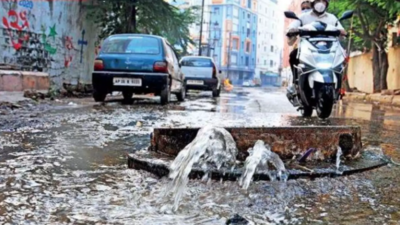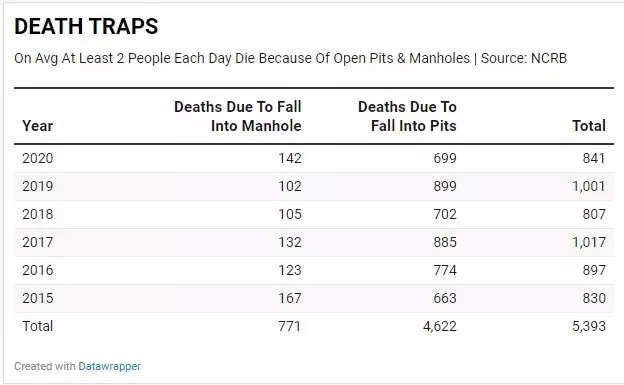Top Searches
- News
- India News
- Preventable Deaths: In India, at least 2 die each day due to open pits & manholes
Preventable Deaths: In India, at least 2 die each day due to open pits & manholes

Representative photo
In India, at least one person loses her/his life because of open pits and manholes every 12 hours with a staggering 5,393 such deaths recorded since 2015, including 841 in 2020. As per the National Crime Records Bureau (NCRB), the agency that collates and publishes crime, accidental deaths, and suicide data from across India, these deaths are recorded as “accidental deaths” caused when a person accidentally falls.
However, lawyers and urban experts, while terming them “absolutely preventable deaths”, recommend that the government consider them as “deaths caused due to negligence if not culpable homicide not amounting to murder” and not merely record them as accidental falls.
Analysis of data between January 1, 2015 and December 31, 2020 shows that only 3% of people involved in such falls survive with injuries. In the said period, 5,568 people fell into either a manhole or a pit, of whom only 175 survived with injuries, the remaining 97% (5,393) died after they fell.

Advocate Clifton Rozario, said: “There’s a concept called absolute liability: Maintenance of manholes, sewers, and roads are all statutory duties of the state’s authorities, which is why we pay tax and we have governments and bureaucracy. So when someone dies because of an open manhole or gets electrocuted because of an unattended live wire, it should be the responsibility of the authorities. All these deaths are preventable. ”
Not only are they liable to compensate the families of victims monetarily but they are also criminally liable, Rozario said, adding that such deaths, therefore, are deaths caused by negligence or dereliction of duty.
While the data shows that 2020 saw a 16% reduction in such deaths compared to the previous year — 841 from 1,001 — there were still more than two deaths per day. Experts also pointed out that the deaths for the year have to be considered as high given that there was nearly no movement of people or vehicles for several months owing to restrictions imposed because of Covid-19.
Further, of all deaths caused by such falls in the said period, only around 14% were caused by people falling into manholes and the remaining 4,622 were caused by falls into pits.
MG Devasahayam, a former IAS officer with extensive experience in UDD and presently working on urban issues in Tamil Nadu, said: “Given that this is clearly a governance issue, it is important to fix accountability. Therefore, it becomes necessary that we first classify these deaths appropriately. As long as we call them accidental falls, there is going to be no change in the scenario on the ground.”
He added that with roads being integrated structures, several departments are accountable for their quality and that most governments pay little or no attention to the kind of corruption that happens in municipal departments. “We always try and find mistakes made by the pedestrians or motorists instead of looking at the problem — the existence of open manholes and pits,” he said.
However, lawyers and urban experts, while terming them “absolutely preventable deaths”, recommend that the government consider them as “deaths caused due to negligence if not culpable homicide not amounting to murder” and not merely record them as accidental falls.
Analysis of data between January 1, 2015 and December 31, 2020 shows that only 3% of people involved in such falls survive with injuries. In the said period, 5,568 people fell into either a manhole or a pit, of whom only 175 survived with injuries, the remaining 97% (5,393) died after they fell.

Advocate Clifton Rozario, said: “There’s a concept called absolute liability: Maintenance of manholes, sewers, and roads are all statutory duties of the state’s authorities, which is why we pay tax and we have governments and bureaucracy. So when someone dies because of an open manhole or gets electrocuted because of an unattended live wire, it should be the responsibility of the authorities. All these deaths are preventable. ”
Not only are they liable to compensate the families of victims monetarily but they are also criminally liable, Rozario said, adding that such deaths, therefore, are deaths caused by negligence or dereliction of duty.
While the data shows that 2020 saw a 16% reduction in such deaths compared to the previous year — 841 from 1,001 — there were still more than two deaths per day. Experts also pointed out that the deaths for the year have to be considered as high given that there was nearly no movement of people or vehicles for several months owing to restrictions imposed because of Covid-19.
Further, of all deaths caused by such falls in the said period, only around 14% were caused by people falling into manholes and the remaining 4,622 were caused by falls into pits.
MG Devasahayam, a former IAS officer with extensive experience in UDD and presently working on urban issues in Tamil Nadu, said: “Given that this is clearly a governance issue, it is important to fix accountability. Therefore, it becomes necessary that we first classify these deaths appropriately. As long as we call them accidental falls, there is going to be no change in the scenario on the ground.”
He added that with roads being integrated structures, several departments are accountable for their quality and that most governments pay little or no attention to the kind of corruption that happens in municipal departments. “We always try and find mistakes made by the pedestrians or motorists instead of looking at the problem — the existence of open manholes and pits,” he said.
FacebookTwitterLinkedinEMail
Start a Conversation
end of article
Quick Links
Coronavirus in MumbaiFarm bill 2020Farmers protestCoronavirus in DelhiCoronavirus in BangaloreCoronavirus symptomsCoronavirus in IndiaWest Bengal elections 2021Coronavirus NewsSolar EclipseNPRWhat is NRCCAB BillCAB and NRCAssam election 2021Podcast newsLok SabhaTamil Nadu Election 2021CongressBJP newsKerala Elections 2021Indian ArmyISRO newsSupreme Court

